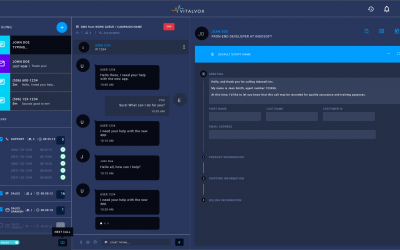The Conflict Resolution Strategies Guide is essential for managing a contact center, especially when conflicts occur among agents, supervisors, or customers. The high-stress environment can often lead to misunderstandings and disagreements that disrupt team harmony. However, by implementing the right strategies, you can maintain harmony in contact centers, ensure smooth operations, and foster a positive work environment.
1. Promote Open Communication
One of the most effective conflict resolution strategies is fostering open communication. In contact centers, where stress levels run high, encouraging team members to express their concerns openly can prevent conflicts from escalating quickly. Therefore, creating an environment that promotes dialogue is crucial.
- Encourage Feedback: Create channels for agents to provide feedback on their work environment and team dynamics through regular team meetings, anonymous surveys, or one-on-one sessions with supervisors. This approach helps you catch potential issues early.
- Practice Active Listening: Train supervisors and team leaders to listen actively by paying attention to verbal and non-verbal cues, acknowledging concerns, and responding thoughtfully. As a result, agents feel heard and valued, reducing frustration and potential disputes.
Open communication not only resolves conflicts but also strengthens trust among team members, fostering a culture of transparency and collaboration.
2. Implement Conflict Resolution Training
Equipping your team with conflict resolution skills helps maintain harmony in contact centers. Training empowers agents to handle disputes professionally, minimizing disruptions that could impact service quality.
- Role-Playing Scenarios: Use role-playing exercises during training sessions to simulate common conflicts that occur in a contact center. This hands-on practice prepares agents to handle real-world situations effectively and confidently.
- Develop Emotional Intelligence: Encourage emotional intelligence training to help agents manage their emotions and understand others’ perspectives during conflicts. By doing so, agents learn to navigate tense situations calmly.
Regular training ensures that agents deal with conflicts constructively, which ultimately benefits the entire contact center by maintaining a positive atmosphere.
3. Define Clear Conflict Resolution Policies
Clear policies provide a structured approach to resolving conflicts, ensuring consistency and fairness in your contact center. Without a defined process, conflicts can become more complicated and harder to resolve.
- Establish Procedures: Outline step-by-step procedures for handling conflicts, including reporting methods and timelines. This structure includes mediation steps or escalation paths when conflicts remain unresolved at the initial level.
- Communicate Expectations: Make sure all agents know the conflict resolution policies from the start. Share this information during onboarding sessions, in employee handbooks, and through regular reminders to keep the guidelines fresh in everyone’s mind.
Defining clear policies sets a standard for behavior and conflict management, which promotes a harmonious work environment and reduces uncertainty among staff.
4. Address Conflicts Promptly
Address conflicts as soon as they arise to prevent small issues from growing into bigger problems. In a busy contact center, conflicts can quickly impact team morale and productivity if not managed immediately.
- Intervene Immediately: Train supervisors to recognize early signs of conflict and step in promptly. This may involve a private discussion with the parties involved or initiating mediation to find a solution before tensions escalate.
- Follow Up: Check in with the parties after resolving a conflict to ensure that the resolution was effective and that no lingering issues remain. This step is crucial in demonstrating that you value your team’s well-being.
Prompt intervention helps maintain harmony and ensures conflicts do not disrupt the workflow, keeping the team focused on their tasks.
5. Encourage a Positive Work Culture
A positive work culture can prevent conflicts before they start. In contact centers, where pressure and high call volumes are common, fostering a supportive environment significantly reduces disputes among team members.
- Recognize and Reward: Regularly acknowledge team achievements and individual contributions. Recognition boosts morale and reduces friction among team members, as they feel appreciated for their efforts.
- Promote Team-Building Activities: Organize activities that build camaraderie among agents, such as team lunches, group challenges, or social events. These activities strengthen relationships and improve cooperation during work.
A positive work culture creates an environment where conflicts are less likely, and when they do occur, they can be resolved more amicably. This approach enhances overall team performance and job satisfaction.
Contact Us for Conflict Resolution Strategies Guide
The Conflict Resolution Strategies Guide shows that building a harmonious contact center begins with the right conflict resolution strategies. If you need expert advice or customized training solutions, we are ready to help. Contact us today to see how we can support your efforts in creating a productive and harmonious workplace.



